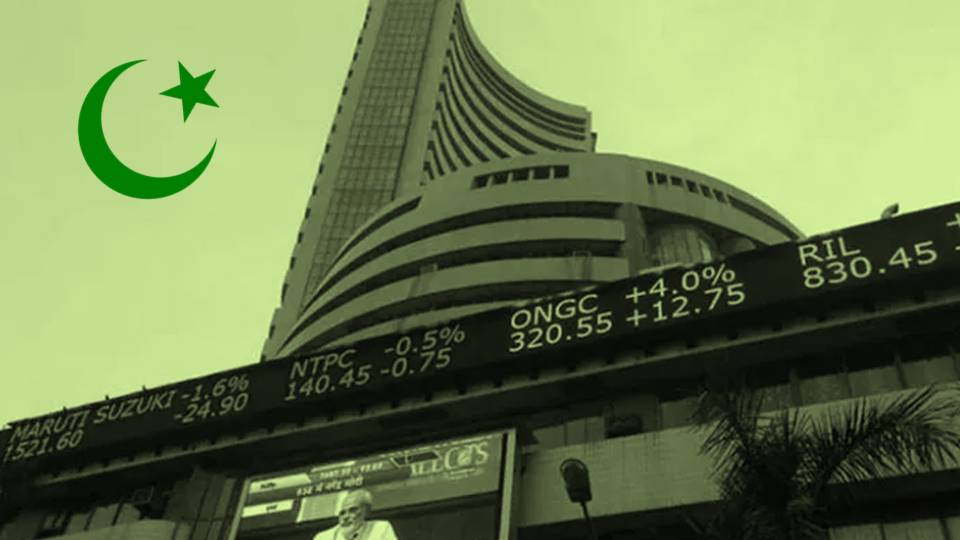Considering the social, economic, and political exclusivity of Islam in the secular republic of India, it seems that Indian secularism has been deemed with Islamic lenses. Already, governing their community with the personal Sharia law, Muslims in ‘secular’ India are running a parallel economy based upon the core Islamic laws.
A stock exchange is an institution for the orderly buying and selling of listed securities. NIFTY is the equity index managed by the National Stock Exchange, which measures the securities trading of the top 50 companies. For the convenience of investors, NIFTY has done a categorisation of indices based on various sectors and themes.
The Sectoral divisions of NIFTY are – Bank Index, Healthcare Index, Media Index, IT index, Oil and Gas Index, and others. The thematic categorisation of NIFTY is – Energy Index, Infrastructure Index, Commodities Index, Shariah Indices, and many others.
NIFTY Shariah compliant with the Islamic law
Shariah Index has especially been categorized to segregate the listed companies whose products are compliant with Islamic beliefs. The Shariah indices have been created for those whose constituents have been screened for compliance by a board that is well-versed in the principles of the Quran.
In a way, the Shariah indices segregate investors as well as companies based on their religious beliefs. It allows investors to effectively invest in those companies that engage in businesses in consonance with the Islamic faith.
Based on their Islamic themes, NIFTY has theoretically been divided into three Shariah Indices – NIFTY50 Shariah, NIFTY500 Shariah, and NIFTY Shariah25. To categorise these Islamic indices, National Stock Exchange has contracted with Taqwaa Advisory and Shariah Investment Solutions (TASIS) to provide the Shariah screens and filter the stock based on Islamic beliefs.
The Taqwaa Advisory and Shariah Investment Solutions are well versed with Islamic laws, and based on the Shariah beliefs, they categorise companies for Shariah Indices.
Also read: World Health Organization to World Halal Organization: the Islamization of WHO
Shariah Screening Process
Based on Islamic beliefs, two types of screening have been defined. The first is based on the type of business, and the second is based on financial transactions. Businesses and Financial transactions which are considered ‘haram’ in Islam will not be included in the Shariah Indices.
Following the Islamic beliefs laws, the businesses that are being officially screened out of the Shariah Indices are:
- Conventional financial services such as banks, insurance companies, finance, and investment companies, and stock broking.
- The production, sale, and marketing of non-Halal food and beverages such as Pork, Alcohol, Tobacco, and other items.
- Companies involved in the production or distribution of vulgar entertainment, such as films and other recreational activities where vulgarity and promiscuity is a part and parcel of the business undertaken.
- Hotels and restaurants that provide non-Halal products or entertainment. Gambling, narcotic drugs, and other businesses that are involved in the production of toxic products.
Similarly for financial transactions, the amount of debt, cash, and the proportion of revenue that is accrued from non-compliant activities is also taken into consideration.
Since interest-based transactions are prohibited by Shariah, companies passing the business screening stage are further screened. It is done to ensure that their dealings involving interest-based debt or earnings out of funds on interest are within the maximum tolerance limits set by Shariah scholars.
The prescribed norms by Taqwaa Advisory and Shariah Investment Solutions are:
- The Interest based-debt should be less than or equal to 25% of Total Assets.
- Interest income plus returns from interest-based investments should be less than or equal to 3% of the total income.
- Receivables plus cash and bank balances should be less than or equal to 90% of Total Assets.
Also read: Give us ‘Halal’ Sanitizers: Muslims demand alcohol free sanitizers amid Coronavirus
Islamisation of ‘Secular’ Indian Economy
To be included in the Shariah Index and attract investment based on Islamic beliefs, the companies have to follow the prescribed guidelines for businesses and financial transactions.
Economist Martin L Ross, defining the Islamic understanding of economics, states that Shariah “does not view money as an asset and hence does not favour the practice of being able to make money from money”.
In late 2008, a financial sector reform committee, headed by former RBI governor Raghuram Rajan, had advocated for the interest-free banking system based on Islamic beliefs in the country. Raghuram Rajan, during his tenure in 2014 as the RBI governor, had even approved the Sharia Mutual Fund system and had argued for Islamic Banking system in India. However, in late 2017, in an RTI reply, RBI outrightly rejected such a proposal.
Lending money and charging interest on the same is considered ‘haram’ under Islamic law. Muslims do not believe in the sale of products whose existence is not certain. For example, they do not believe in the concept of insurance as the product is based on future eventuality which may or may not happen.
This exclusion and segregation is nothing but an effort toward the Islamisation of Indian Economy and Business. They are trying to impose and create a parallel economy based on their Shariah beliefs.
What their literature, culture, or sculpture adore is not a subject of the secular Indian state. Like Shariat personal law in social governance, the Sharia NIFTY is an attempt to create an exclusive economic market and business.
Branding companies and investors based on their religious beliefs cannot be justified in a secular republic like India. Almost every religious belief from around the world is accepted in India, and about 9 major religions are practiced in India.
Every religion has its own history, polity, and economy. If every religion is allowed to practice its own system of governance, then the state will lose its significance. Consequently, the government should urgently ban such religious categorisation of the investment market.
Support TFI:
Support us to strengthen the ‘Right’ ideology of cultural nationalism by purchasing the best quality garments from TFI-STORE.COM
